
Geranium is a genus of 422 species of annual, biennial, and perennial plants that are commonly known as geraniums or cranesbills. They are found throughout the temperate regions of the world and the mountains of the tropics, with the greatest diversity in the eastern part of the Mediterranean region.

Geranium maculatum, the wild geranium, spotted geranium, or wood geranium, is a perennial plant native to woodland in eastern North America, from southern Manitoba and southwestern Quebec south to Alabama and Georgia and west to Oklahoma and South Dakota.

Rosa chinensis, known commonly as the China rose, Chinese rose, or Bengal rose, is a member of the genus Rosa native to Southwest China in Guizhou, Hubei, and Sichuan Provinces. The first publication of Rosa chinensis was in 1768 by Nikolaus Joseph von Jacquin in Observationum Botanicarum, 3, p. 7 & plate 55.

Erodium malacoides is a species of flowering plant in the geranium family known by the common names Mediterranean stork's bill, soft stork's-bill and oval heron's bill. This is an annual or biennial herb which is native to much of Eurasia and North Africa but can be found on most continents where it is an introduced species.
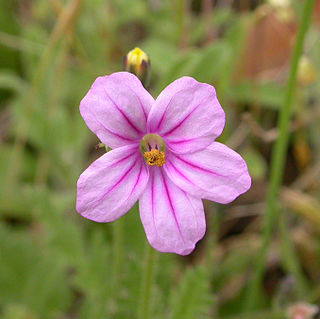
Erodium botrys is a species of flowering plant in the geranium family known by the common names longbeak stork's bill, Mediterranean stork's-bill and broadleaf filaree.

Erodium moschatum is a species of flowering plant in the geranium family known by the common names musk stork's-bill and whitestem filaree. This is a weedy annual or biennial herb which is native to much of Eurasia and North Africa but can be found on most continents where it is an introduced species.

Geranium bicknellii is a species of geranium known by the common names Bicknell's cranesbill and northern cranesbill. It is native to much of the northern half of North America, where it can be found in a number of forest and woodland habitats. This is an annual or biennial herb which grows hairy stems up to about half a meter long. It may be erect or lie near the ground. Each leaf is several centimeters long and wide and is divided into several lobes, each of which may have smaller lobes or teeth. Flowers grow singly or in pairs and have pointed sepals and small lavender petals, each with a notch in the tip. The fruit has a rounded body with a long, straight style about 2 centimeters in length and tipped with a small beak.
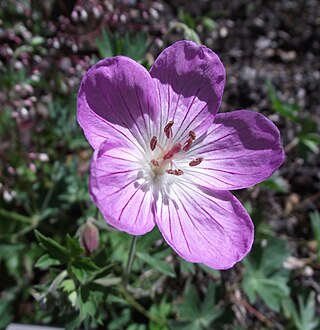
Geranium californicum is a species of Geranium known by the common name California cranesbill. It is endemic to California, where it grows in the Sierra Nevada and coastal ranges in the southern part of the state.

Geranium carolinianum is a species of geranium known by the common name Carolina crane's-bill, or Carolina geranium. This species is native to North America, where it is widespread and grows in many types of habitat. There are two varieties; Geranium carolinianum var. carolinianum and the Geranium carolinianum var. sphaerospermum. This is a summer or winter annual herb. It can be considered invasive depending on the region, when it is found in the United States it is considered to be native.

Geranium oreganum is a species of geranium known by the common name Oregon cranesbill, or Oregon geranium. It is native to western North America from California to Alberta, where it grows in mountain forests and meadows. This is a perennial herb growing generally erect to heights of 40 to 80 centimeters. The slender stems have a foliage of large palmate leaves up to 15 centimeters wide and divided into several segments, each of which is subdivided into rounded or pointed lobes. The flower has pointed sepals beneath rounded lavender to purple petals. The fruit has a small body with a pointed style column up to five centimeters long.

Crocanthemum greenei is a rare species of flowering plant in the rock-rose family known by the common name island rush-rose. It is endemic to the Channel Islands of California, where it grows in the chaparral of the rocky seaside slopes. It is present on three of the eight islands, where it has historically been threatened by feral herbivores such as the Santa Cruz sheep and is making a gradual recovery. It is a federally listed threatened species.

Potentilla californica, also known as California horkelia, is a species of flowering plant in the rose family.
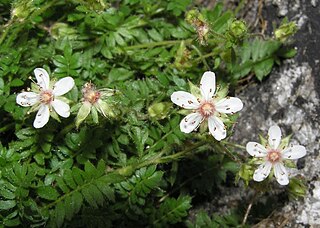
Potentilla callida, commonly known as Tahquitz mousetail, is a rare species of flowering plant in the rose family.

Bolandra californica is a species of flowering plant in the saxifrage family, known by the common names Sierra bolandra and Sierra false coolwort. It is one of two species in the small genus Bolandra. It is endemic to the High Sierra Nevada of California, where it is an uncommon member of the coniferous forest understory.
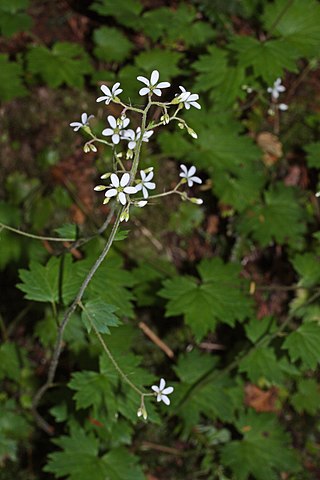
Boykinia occidentalis is a species of flowering plant in the saxifrage family known by the common name coastal brookfoam. It is native to the west coast of North America from British Columbia to California, where it grows in shady areas near riverbanks and streams. It is a rhizomatous perennial herb producing large, rounded leaves with blades up to 45 centimeters long and 12 wide, borne on petioles up to 30 centimeters in length. Each leaf has several rounded lobes with dull teeth along the edges. The inflorescence reaches 30 to 60 centimeters tall on a thin stem. It bears an open array of many small white flowers, each with five tiny pointed sepals and five larger oval petals.
Erodium brachycarpum is a species of flowering plant in the geranium family known by the common names hairy-pitted stork's-bill and shortfruit stork's bill. It is native to southern Europe but it is known elsewhere as an introduced species and often a weed, such as the west coast of the United States where it is widespread in California and Oregon.

Geranium potentilloides, belongs to the family Geraniaceae, and is a small prostrate perennial herb that can grow up to 60cm high. The species is commonly referred to as Soft Cranesbill or Cinquefoil geranium.
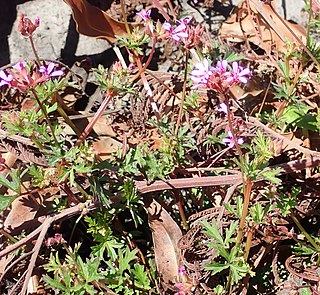
Pelargonium grossularioides is a species of geranium known by the common names gooseberry geranium and coconut geranium. It is native to southern Africa and it is known in coastal California and parts of India as an introduced species. It is sometimes grown as a garden geranium. This is a glandular, aromatic perennial herb with an erect, angular, reddish stem 20 to 50 centimeters tall. The green to reddish leaves are a few centimeters long and slightly lobed with toothed edges. The inflorescence is an umbel of 3 to 50 flowers in shades of light pink to dark reddish purple. There are five narrow petals no more than 6 millimeters long.
Ribes amarum is a species of currant known by the common name bitter gooseberry. It is endemic to California, where it is known from mountains, foothills, and canyons. Its habitat includes Chaparral.
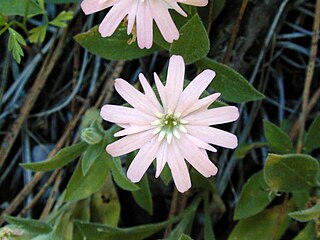
Silene hookeri is a species of flowering plant in the family Caryophyllaceae known by the common names Hooker's silene, Hooker's catchfly, Hooker's Indian pink, and Hooker's glandular campion.




















